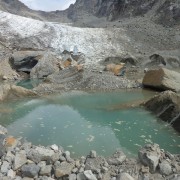The Stream, June 7: Drugs and Hormones in Water Supplies
Biochemistry
Scientists at Idaho State University experimenting with a species of minnow found that low levels of antidepressants altered the genes associated with autism in humans, the New Scientist reports. Next, the researchers will test the effect on mice.
Estrogen in wastewater lagoons on large dairy farms was shown to persist in water supplies for months and years, according to research from the Illinois Sustainable Technology Center. The hormones are produced by lactating cows and are present at levels that could disrupt the reproductive systems of aquatic animals.
Climate Change
Cities in Latin America and Canada are farther along in their climate change adaptation plans than cities in other world regions, according to a survey of 468 metropolitan areas by MIT and ICLEI, an organization that helps local governments with sustainability plans.
The BBC takes a look at the economics and politics of climate change in Virginia. Rising seas are killing trees in coastal salt marshes while some of the Republican-led state’s largest cities are rebuilding roads and preparing for floods.
Confused about all the Rio +20 talk? The Guardian has you covered with a background Q and A.
Great Lakes Echo reports on a fancy new method of preventing some invasive species from entering the largest freshwater system in the U.S.—zapping them with ultrasound. The device targets small organisms, such as plankton and bacteria, while they are still in a ship’s ballast tanks and before they are discharged in open waters.
The Stream is a daily digest spotting global water trends. To get more water news, follow Circle of Blue on Twitter and sign up for our newsletter.
Brett writes about agriculture, energy, infrastructure, and the politics and economics of water in the United States. He also writes the Federal Water Tap, Circle of Blue’s weekly digest of U.S. government water news. He is the winner of two Society of Environmental Journalists reporting awards, one of the top honors in American environmental journalism: first place for explanatory reporting for a series on septic system pollution in the United States(2016) and third place for beat reporting in a small market (2014). He received the Sierra Club’s Distinguished Service Award in 2018. Brett lives in Seattle, where he hikes the mountains and bakes pies. Contact Brett Walton










Leave a Reply
Want to join the discussion?Feel free to contribute!